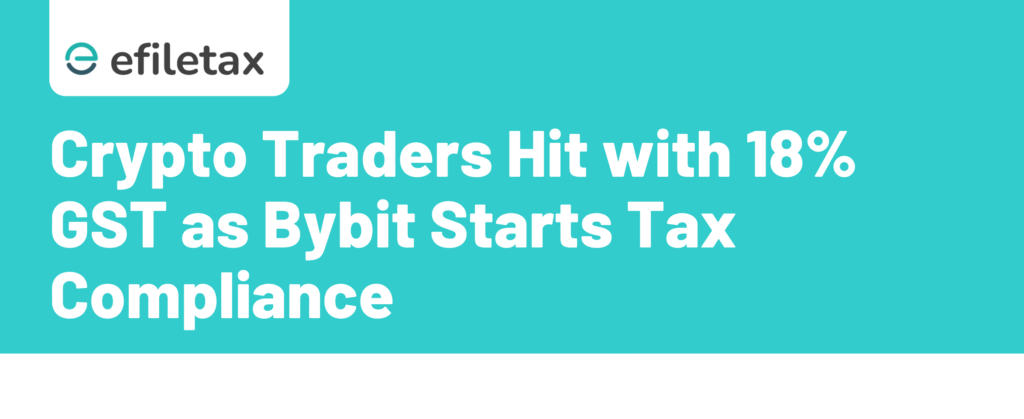
Intro Paragraph:
The new crypto GST in India regime has tightened its grip. Offshore exchanges like Bybit are now charging 18% GST on transaction fees. For Indian users, this means higher trading costs—and a wake-up call on tax compliance. Let’s break down what’s changed, why it matters, and how it affects your crypto trades.
Why Offshore Crypto Exchanges Are Charging 18% GST
The move comes after the Indian government directed offshore crypto platforms to register under GST and collect tax from Indian users.
As of July 2024:
- Offshore exchanges offering services to Indians must register as OIDAR under GST.
- Platforms like Bybit, KuCoin, and OKX are now collecting 18% GST on transaction fees.
- Binance and Coinbase may soon follow if operating without registration.
Legal Basis:
- GST applies under Section 14 of the IGST Act, 2017 for OIDAR services.
- Circular No. 163/19/2021-GST clarified applicability to crypto service providers.
- CGST Notification No. 10/2017 makes it mandatory for OIDAR platforms to collect GST from Indian recipients.
How the 18% Crypto GST Affects Indian Users
Here’s a breakdown of the impact on your trading activity:
| Before July 2024 | After GST on Offshore Exchanges |
|---|---|
| No GST on transaction fees | 18% GST charged by platform |
| Low-cost arbitrage trading | Shrinking profit margins |
| No tax traceability | Higher visibility to GST dept |
Note: This 18% is in addition to the 1% TDS under Section 194S of the Income Tax Act, and your 30% flat income tax on gains.
Which Crypto Services Are Now Taxable Under GST?
The 18% GST applies to:
- Trading fee charged by the platform
- Withdrawal fee, if levied
- Conversion charges (e.g., crypto-to-crypto swap)
- Premium services like futures trading or copy trading
But it does not apply to:
- The crypto purchase value itself
- Transfers to self-wallets without service charges
Expert View: What Tax Professionals Are Advising
“Indian traders using offshore exchanges now have no GST advantage. Even P2P or futures trades will get tracked. It’s time to move to full disclosure,”
— Srinivas G, Chartered Accountant & Tax Litigator
Practical Tip:
If you’re still using unregistered exchanges, beware—reverse charge may apply, and you become liable to pay GST on your own!
What’s the Penalty for Non-Compliance?
If GST isn’t paid on foreign crypto services:
- You may face interest @ 18% per annum
- Penalty up to 100% of unpaid tax under Section 122 of CGST Act
- Possible blocking of crypto withdrawal by RBI/GSTN in future via compliance enforcement
GST or TDS? Here’s a Quick Comparison
| Tax Type | Rate | Applies On | Paid By | Legal Section |
|---|---|---|---|---|
| GST | 18% | Platform fees | Bybit/KuCoin (OIDAR) | IGST Act Sec 14 |
| TDS | 1% | Crypto sell value | Buyer | Sec 194S, IT Act |
| Income Tax | 30% | Gains | Seller | Sec 115BBH |
Can Indian Crypto Users Claim GST Input Credit?
No. If you’re using crypto platforms as an individual trader or investor, GST paid is a cost, not input credit.
Only businesses registered under GST and using crypto for business purposes may try to claim ITC—but this is legally grey and risky without expert advice.
What Should You Do Now?
- Check invoices from Bybit or any offshore platform.
- Verify if 18% GST is applied correctly under OIDAR category.
- Declare crypto transactions clearly while filing ITR under Schedule VDA.
- For high-frequency traders: consult a tax professional to avoid future litigation.
FAQ: Crypto GST in India
Q1. Will this affect Indian exchanges too?
Indian platforms already charge 18% GST on their service fees. Nothing changes for them.
Q2. Is GST applicable on P2P trades?
Yes, if done through a platform that charges fees. The service component gets taxed.
Q3. Can GST paid on Bybit be refunded?
Not unless you’re a GST-registered business eligible for input credit. For most individuals, it’s a sunk cost.
Summary
Crypto GST in India now applies at 18% to fees charged by offshore exchanges like Bybit. This impacts Indian users directly, adds to trading costs, and increases tax scrutiny under GST and Income Tax laws.
Final Thoughts
The compliance net is tightening for Indian crypto users. GST on Bybit is just the beginning—expect full regulation soon.
Need help navigating crypto taxes or GST filings? Efiletax is here to assist you with reliable, updated, and expert-backed compliance support.